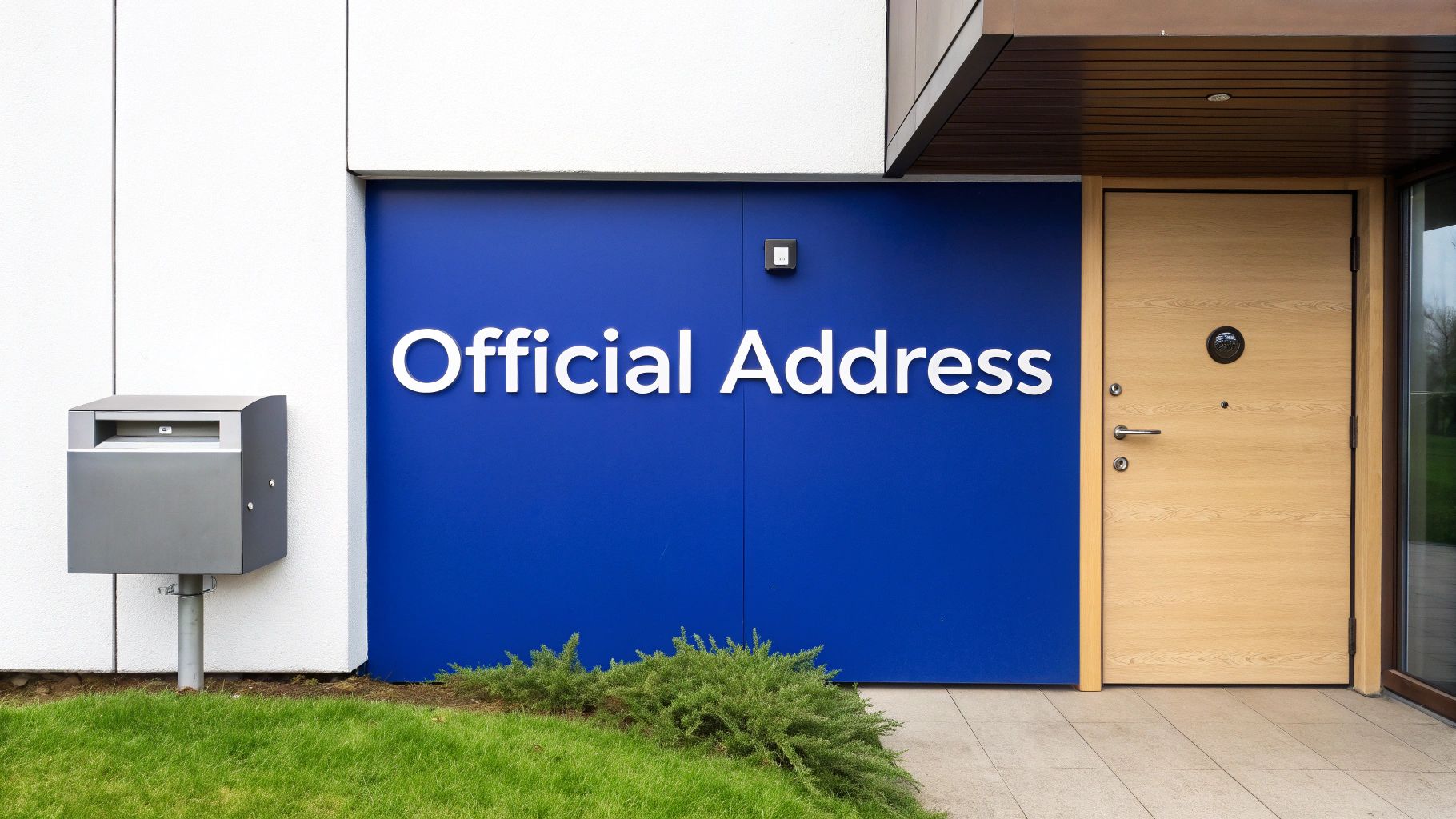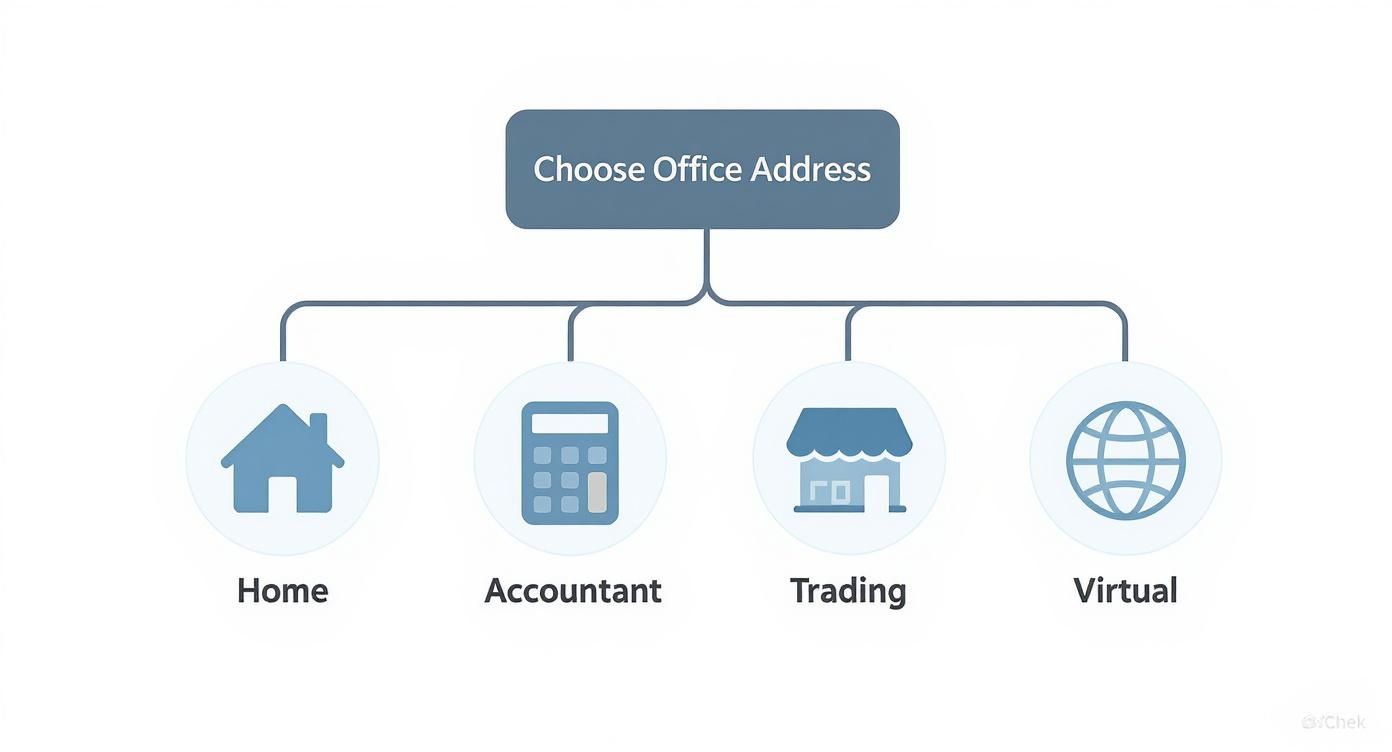Your Guide to a Director Service Address
Your Guide to a Registered Office Address – When you set up a limited company in the UK, one of the first things you’ll need is a registered office address. Think of it as your company’s official home—it’s the address where government bodies like Companies House and HMRC will send all statutory notices and legal letters. It’s a non-negotiable requirement right from day one.
Understanding Your Company’s Official Address

This address acts as the single, reliable point of contact for all your company’s formal communications. Your team might be working from anywhere—a co-working space, their homes, or even a coffee shop—but your registered office is the one constant anchor for all official business.
Don’t forget, this address isn’t just for paperwork. It’s a public declaration of your company’s location, and anyone can look it up on the Companies House register. This has real-world consequences for both your privacy and your professional image, making your choice of address a genuinely important business decision.
The Legal Framework and Its Purpose
At its core, a registered office address exists to make sure your company can always be contacted by official bodies. It’s the stable location for serving legal documents, like court papers or statutory demands, which helps maintain corporate transparency and accountability.
A key rule is that the address must be a real, physical location within the right part of the UK—either England & Wales, Scotland, or Northern Ireland, depending on where your company was incorporated. You can’t just pick any address.
As of March 2024, the Economic Crime and Corporate Transparency Act made it illegal for UK companies to use a PO Box as their registered office. This change was brought in to make sure every company has a verifiable, physical address where documents can be delivered and signed for, which helps to clamp down on economic crime.
This means you can’t use a simple mail-drop service or a PO Box. There has to be someone available at the address to receive and acknowledge important mail.
Distinguishing It From Other Addresses
It’s easy to get your registered office confused with other business addresses, but they all have very different jobs. Let’s clear things up.
Before we dive in, it helps to see the addresses side-by-side to understand what each one is for. They all serve distinct, legally important functions.
Understanding Key UK Business Addresses
| Address Type | Primary Purpose | Public Record Status | Example Usage |
|---|---|---|---|
| Registered Office Address | The official, legal address for statutory mail from Companies House and HMRC. | Yes, fully public on the Companies House register. | Receiving official government notices, legal documents, and statutory demands. |
| Director’s Service Address | The official correspondence address for a specific company director. | Yes, fully public on the Companies House register. | Receiving personal statutory mail addressed to the director from Companies House. |
| Trading Address | The physical location where your day-to-day business operations take place. | No, not required on the public record (but often used publicly). | Putting on your website, business cards, and invoices for customers and suppliers. |
As you can see, a trading or business address is where the actual work happens—it might be your shop, workshop, or office. This is the one you’d normally give to customers.
It’s also completely different from a Director’s Service Address, which is the official contact address for a company director in their personal capacity. Getting these straight is crucial for keeping your company compliant. For a deeper look at the director’s address, check out our guide to a director service address.
Choosing Your Registered Office Address
Picking your company’s registered office address is one of those foundational decisions you make right at the start. Each option strikes a different balance between privacy, cost, and professionalism, so there’s no single “best” choice. The right one really depends on your business model, your budget, and where you see your company heading.
Let’s break down the most common routes people take. We’ll get into the real-world pros and cons of using your home, your accountant’s office, your actual business premises, or a dedicated professional address service.
Using Your Home Address
For lots of new entrepreneurs, using a home address is the default move. It doesn’t cost a penny, it’s convenient, and there’s no extra setup involved, which is a big win when you’re just starting out and watching every quid.
However, that convenience comes at a price: your privacy. Your home address will be published on the Companies House public register, making it fair game for anyone to see—customers, suppliers, and a whole load of unsolicited junk mail. It can really blur the lines between your personal and professional life.
On top of that, using your home for business might actually go against the terms of your mortgage or tenancy agreement. It’s vital you check those documents carefully before committing, as a breach could cause some serious headaches down the line.
Using Your Accountant’s Address
Another popular choice is to use your accountant’s or solicitor’s office. This instantly gives your business a more professional look and means an expert is on hand to receive and sort through any important legal documents that arrive.
This approach creates a clear separation between your home and your business, keeping your personal details private. It also adds a layer of credibility, as your company is linked to an established professional firm.
The downside? This service isn’t free and will be another recurring expense. You also become reliant on your accountant to forward your mail promptly. And if you ever decide to switch accountants, you’ll have the admin chore of officially changing your registered office address with Companies House.
A key consideration is the perceived prestige and location of the address. An address in a well-known business district can enhance your company’s reputation and credibility with potential clients and investors.
The location of your registered office can subtly shape how people see your business. It’s why so many companies choose addresses in major commercial centres. For instance, London has the highest concentration of registered office addresses in the UK, which reflects its status as a global business hub. Recent analysis shows the capital doesn’t just have the most registered offices, but also the densest business presence, with the South East coming in second. You can explore more about these regional business patterns to get a better feel for the UK’s corporate landscape.
Using Your Physical Trading Address
If your business operates from a physical spot like a shop, workshop, or office, using this as your registered address feels like a no-brainer. It keeps everything in one place and ensures all your mail—both official and commercial—lands right where you are.
This is a straightforward, practical solution for any business with a proper brick-and-mortar presence. It makes mail management a doddle and keeps your operations centralised.
The main catch comes if you’re renting the property. You absolutely must get explicit permission from your landlord to use their property as your registered office. Plus, if your business ever moves, you’ll need to file an address change with Companies House straight away to stay compliant.
Using a Professional Address Service
Professional address services, often known as virtual offices, give you a dedicated registered office address for a monthly or annual fee. These services offer a prestigious address in a prime business location, but without the eye-watering cost of a physical lease.
This option really offers the best of both worlds: maximum privacy for you and a highly professional image for your company. Your home address stays completely off the public record, and your mail is handled securely and forwarded on, often with digital scanning options so you can see it immediately.
While it’s a paid service, the cost is usually quite modest and provides huge value in terms of privacy, credibility, and sheer convenience. It’s an ideal setup for online businesses, consultants, and international entrepreneurs who need a solid UK presence.
Comparing Your Options at a Glance
To lay it all out clearly, here’s a straightforward comparison of the main factors for each choice.
Deciding on the right registered office is a personal choice, but seeing the options side-by-side can make it much easier to weigh up what matters most to you and your business.
Comparing Registered Office Address Options
| Option | Key Benefit | Main Drawback | Best Suited For |
|---|---|---|---|
| Home Address | No additional cost and simple to set up. | Puts your private address on the public record. | Brand-new startups and sole traders on a very tight budget. |
| Accountant’s Address | Adds professional credibility and expert mail handling. | Creates dependency on a third party and incurs a fee. | Businesses that value a professional image and close ties with their accountant. |
| Trading Address | Consolidates all business mail into one location. | Requires landlord permission and updates if you move. | Retailers, workshops, and companies with a stable physical location. |
| Professional Service | Offers maximum privacy and a prestigious address. | Involves an ongoing subscription fee. | Remote businesses, consultants, and anyone wanting to protect their privacy. |
Ultimately, whether you prioritise cost, convenience, privacy, or prestige will guide you to the best solution. Taking a moment to think it through now will save you potential hassle later on.
How to Set Up or Change Your Address
Whether you’re just launching your company or moving an established business, getting your registered office address set up correctly isn’t just good admin—it’s a legal must-do. The process itself is pretty straightforward, but you need to be precise to stay compliant and make sure you don’t miss any important official mail.
For brand new companies, this is one of the very first details you’ll sort out. As you fill in the incorporation form (IN01), you’ll find a specific section for your proposed registered office. Nail this from the start, and Companies House and HMRC will know exactly where to send statutory documents from the moment your company officially exists.
Registering an Address for a New Company
When you’re bringing your company to life with the incorporation paperwork, you’ll need to declare its registered office. Remember, this must be a physical UK address in the right part of the country—an English company needs an address in England or Wales, for instance.
This decision tree gives you a quick visual rundown to help you figure out the best option for your new venture.

As the infographic shows, the best choice really comes down to what you prioritise. Are you aiming to keep costs to a minimum by using your home, or is maximising privacy with a professional service more your style?
Changing an Existing Company’s Address
If your business is already up and running, you’ll need to let Companies House know as soon as you change your registered office. The official way to do this is by filing a Form AD01 (Change of registered office address). The quickest route is to file it online, which usually gets processed within 24 hours. You can also send it by post, but that will take a bit longer.
It’s absolutely vital to remember that the change isn’t official until Companies House has processed your AD01 form. Until you get that confirmation, your old address is still the legal one, so you must keep checking it for any official mail.
Dragging your feet on updating your address is a breach of compliance and can lead to some serious headaches, including fines or even getting your company struck off the register. For a step-by-step guide on the process, you can find out more about a Companies House change of registered address right here.
Your Post-Change Compliance Checklist
Once Companies House confirms your new address, you’re not quite done. You need to spread the word to make sure your business continues to run like a well-oiled machine.
Here’s a quick checklist of who to tell:
- HMRC: Don’t forget to inform them separately for Corporation Tax, VAT, and PAYE. They don’t automatically get the update from Companies House.
- Your Bank: All your business bank accounts need to be updated with the correct address.
- Insurers: Get in touch with your providers for public liability, professional indemnity, or any other business insurance policies.
- Customers and Suppliers: Make sure your new address is on all invoices, contracts, and other correspondence.
- Company Stationery: This is a big one. Update your letterheads, business cards, and the legal information page on your website.
Ticking off this list ensures everything is consistent, maintaining your professional image and preventing any critical communications from getting lost in the post. A little proactivity here goes a long way.
Common Mistakes and How to Avoid Them

Getting your registered office address set up is a big first step, but the job isn’t done. Your legal duties are ongoing, and keeping that address compliant protects your company’s good standing. It’s more than just having an address on paper; you need to be sure it’s active, accessible, and up-to-date at all times.
Unfortunately, it’s all too easy for busy founders to fall into a few common traps. These slip-ups, from simple admin oversights to major compliance failures, can bring serious consequences—think fines, a damaged reputation, or even having your company struck off the register. Let’s walk through these pitfalls and, more importantly, how you can sidestep them.
Forgetting to Update Companies House After a Move
This is, by a long shot, the most frequent mistake we see. You move your business or switch your address provider, but in the whirlwind of relocating, you forget to file the AD01 form with Companies House. This tiny oversight means official bodies are sending critical legal notices to an old, unchecked address.
Missing these documents isn’t just a minor headache. It could mean you fail to respond to a legal claim, leading to a default judgment against your company without you even knowing about it.
Actionable Solution: Put “Update Registered Office” at the very top of your moving checklist. File the AD01 form online for the quickest result—it’s usually confirmed within 24 hours. Don’t tick this task off your list until you have that confirmation from Companies House.
Using a Prohibited Address Type
The rules are black and white: your registered office must be a physical location in the correct UK jurisdiction. Despite this, some businesses mistakenly use an address that simply isn’t allowed.
A classic example is using a PO Box. Since the Economic Crime and Corporate Transparency Act 2023, PO Box numbers are strictly forbidden for registered offices. Why? Because they don’t represent a physical place where legal documents can be formally served.
Actionable Solution: Always double-check that your chosen address is a genuine, physical location. If you’re using a professional address service, get confirmation from the provider that their service is fully compliant with all Companies House regulations for a registered office.
Letting a Virtual Office Subscription Lapse
A virtual office is a brilliant tool for protecting your privacy and projecting a professional image. But it all hinges on an active subscription. If you forget to renew your service or a payment fails, your provider will stop accepting your mail and will be legally obliged to tell Companies House you’re no longer using their address.
This instantly puts your company in breach of the Companies Act 2006. Operating without a valid registered office address is a serious offence that can lead to immediate action from regulators.
Your company could be flagged as non-compliant and untraceable, which is a major red flag for the authorities.
Actionable Solution: Treat your virtual office subscription like your business electricity or internet bill. Set up automatic renewal or pop calendar reminders in your diary well ahead of the expiry date. If you decide to switch providers, make sure your new address is registered and confirmed before the old subscription runs out to avoid any gaps in compliance.
Failing to Display Your Company Name
This is a lesser-known rule, but it’s just as important. You are legally required to display your company name at your registered office address. It must be positioned so that any visitor can easily see it.
The only exception to this rule is if your registered office is your home address. For all other locations, including an accountant’s office or a shared workspace, your company name has to be visible.
Actionable Solution:
- Check with your provider: If you use a professional service, ask them how they meet this requirement. Most have a directory board or digital display in the lobby.
- Confirm with your accountant: If you’re using their office, make sure your company name is listed on their client directory.
- If using a trading address: Ensure your company name is clearly displayed on a sign at the entrance.
By proactively managing your registered office address, you’re not just ticking a legal box—you’re building a foundation of trust and reliability for your business.
How to Select an Address Service Provider
Choosing a professional address service is a big decision for your business. The right partner boosts your company’s image and keeps you compliant, but the wrong one can lead to lost mail and serious legal headaches. It’s a choice that deserves more than a quick glance at the price tag; you need to think about quality and reliability.
The provider you pick essentially becomes the gatekeeper for your company’s official mail. That’s why you need a solid way to weigh up your options, making sure the service fits your business perfectly, whether you’re a one-person band or a growing company.
Evaluating the Physical Address Itself
First things first: look at the address itself. A prestigious address in a well-known commercial district can give your company an instant credibility boost with clients, investors, and partners. It quietly suggests stability and professionalism before you’ve even said a word.
Think about the impression you want to create. An address in a major city centre might be perfect for a tech start-up or a consulting firm. On the other hand, a location in a specific industrial park could be a better fit for a logistics business. Always check it’s a genuine physical office, not just a mail-handling depot, as this can really shape how people see your company.
The UK’s business landscape is always expanding. As of March 2025, there were around 2.73 million VAT and/or PAYE registered businesses in the UK, a jump of 0.4% from the year before. With limited companies making up most of this figure, your choice of registered office address is a vital part of building a legitimate, transparent presence. You can read more about the UK’s business demographics on the ONS website.
Mail Handling and Forwarding Services
How a provider handles your post is the real heart of the service. You need complete confidence that crucial documents from Companies House or HMRC will get to you quickly and securely. It pays to dig into the details of their mail-handling process.
Here are a few key questions to ask:
- Forwarding Frequency: How often do they send mail on to you? Is it daily, weekly, or just once a month?
- Digital Scanning: Do they offer a ‘scan and email’ service? This is a game-changer for getting urgent letters right away, especially if you’re often on the move.
- Package Handling: Can they sign for and forward parcels, or is the service strictly for letters?
- Collection Options: Is it possible to pop in and collect your mail yourself if you’re ever in the area?
A rock-solid mail management system isn’t just a nice-to-have; it’s essential. Missing a single critical notice can have severe consequences, so this should be at the top of your list. For a deeper dive into what these services involve, take a look at our guide on using a virtual address for your business in the UK.
Scrutinising Costs and Customer Support
At first glance, many services look incredibly cheap, but hidden fees can soon pile up. Make sure you read the small print and check for any extra charges.
A common trap is overlooking extra costs for postage, handling larger packages, or scanning services. A trustworthy provider will have a clear, transparent price list, so you know exactly what you’re paying for without any nasty surprises later on.
Keep an eye out for charges related to:
- Postage Deposits: Do you need to keep a balance topped up to cover forwarding costs?
- Scanning Fees: Is there a per-page or per-item cost for getting your mail scanned?
- Handling Fees: Are there extra charges for receiving parcels over a certain size or weight?
Finally, never underestimate the value of good customer support. When you have an urgent question about a piece of mail, you need a team that’s responsive and helpful. Before you sign up, try contacting their support with a few questions to see how quickly they respond and how helpful they are. A provider that’s attentive before you’re a customer is far more likely to be reliable once you’ve joined.
Got Questions? We’ve Got Answers.
When you’re setting up a company, the rules around your registered office can feel a bit tangled. Don’t worry, it’s a common hurdle. Here are some straightforward answers to the questions we hear most often, designed to give you clarity and confidence.
The Legal Nitty-Gritty
Can my registered office be in a different UK country than where I live?
Yes, but there’s a big catch. Your registered office must be in the same part of the UK that your company is registered in. So, if your business is registered in England, its registered office has to be in England or Wales. Likewise, a Scottish company needs an address in Scotland. You can’t mix and match—it’s a fundamental rule that ensures you fall under the correct legal jurisdiction.
What happens if I don’t keep a valid address on file?
This is one of those things you really don’t want to get wrong. Failing to maintain a valid registered office is a serious compliance breach. Companies House can—and will—issue fines to both the company and its directors. If the problem persists and official bodies can’t get in touch, your company faces the ultimate penalty: being struck off the official register. This means your business is dissolved and legally ceases to exist.
Every company needs a physical street address where it can be reached for official correspondence. This isn’t just a box-ticking exercise; it’s the foundation of corporate transparency, ensuring every business can be held accountable.
This rule is non-negotiable for any limited company in the UK.
The Practical Side of Things
How quickly does an address change take effect?
It’s not instant. The change only becomes official once Companies House has processed and accepted your AD01 form. If you file online, this usually happens within 24 hours, but postal applications can take much longer. Crucially, until you get that confirmation, your old address is still the one on record. Make sure you can still collect mail from there in the meantime so you don’t miss any critical notices.
Does my registered office have to be my trading address?
Absolutely not, and for most small businesses, it’s a smart idea to keep them separate. Think of your registered office as your official, legal mailbox. It’s for Companies House, HMRC, and legal notices only. Your trading address, on the other hand, is for customers, suppliers, and day-to-day business.
Using a professional service for your registered office is a brilliant way to protect your home privacy and give your business a more established, professional image from day one. It creates a clean line between your personal life and your business.
Managing your company’s legal duties shouldn’t feel like a chore. At Acorn Business Solutions, we provide reliable and professional registered office address services to keep your business compliant and your home address private. Explore our address solutions and simplify your business administration today.






